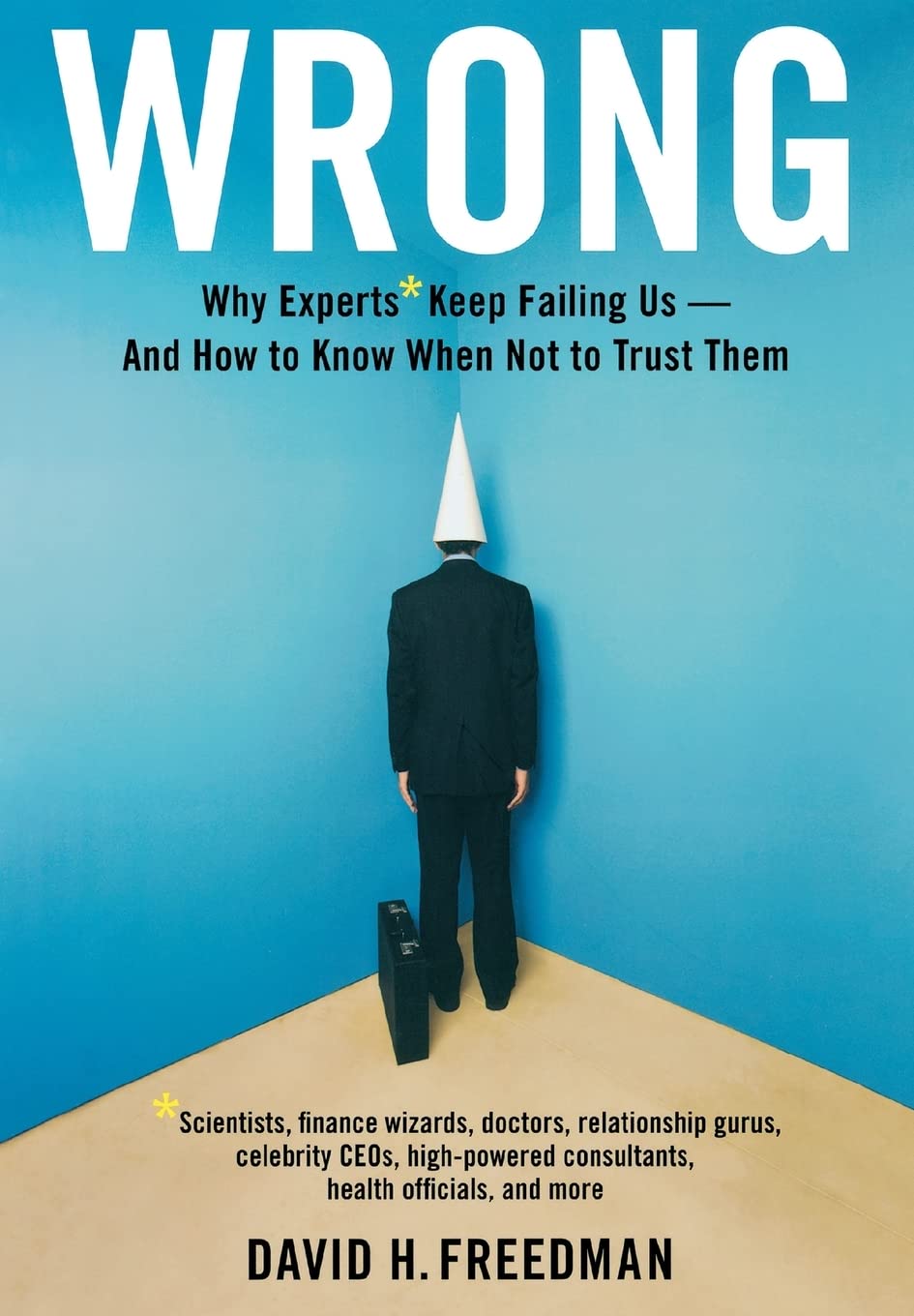"Wrong: Why experts* keep failing us--and how to know when not to trust them" by David H. Freedman
https://www.amazon.com/Wrong-us-Scientists-relationship-cons...
to see why. Experts and expert organizations, scientific or otherwise, often provide wisdom about all aspects of life - and all wrong!
The Covid pandemic proves this point: we can't get agreement on most anything. We'd do better to shitcan the CDC and most other academic and governmental institutions, forget about WHO and start all over again but with an eye to our failed past.
Sure would save a lot of money too, even though it would put a multitude of incompetents onto the streets looking for jobs.
"Wrong: Why experts keep failing us--and how to know when not to trust them Scientists, finance wizards, doctors, relationship gurus, celebrity CEOs, ... consultants, health officials and more"
https://www.amazon.com/Wrong-us-Scientists-relationship-cons...
which begins with an interview with John Ioannidis and goes on to discuss in detail why so many academic (and expert) publications are wrong and how they got that way.
https://www.amazon.com/Wrong-us-Scientists-relationship-cons...
Science is in very, very bad shape in the USA right now. The Covid-19 crisis has pulled back the curtain revealing only a fraction of the errors, uncertainties, and misdeeds of modern "science" and "experts".
Remember that half of all research papers are probably wrong and most of medical research is wrong, according to John Ioannidis:
"Why Most Published Research Findings Are False" by John P. A. Ioannidis:
https://journals.plos.org/plosmedicine/article?id=10.1371/jo...
Lighter reading on this topic:
"Lies, Damned Lies, and Medical Science" by David H. Freedman (who later wrote an excellent book on this topic, see below for link):
https://www.theatlantic.com/magazine/archive/2010/11/lies-da...
"A Researcher’s Claim: 90% of Medical Research Is Wrong" by Maia Szalavitz:
https://healthland.time.com/2010/10/20/a-researchers-claim-9...
And in these days of COVID, HCQ, Remdesevir, crisis, civil unrest and crime I cannot recommend enough David H. Freedman's book titled:
"Wrong: Why experts[1] keep failing us"
with the subtitle
[1]"Scientists, finance wizards, doctors, relationship gurus, celebrity CEOs, ... consultants, health officials and more"
https://www.amazon.com/Wrong-us-Scientists-relationship-cons...
Freedman examines thoroughly the issues that John P. A. Ioannidis has raised.
The argument can be found in much greater detail in the book "Wrong" by David Freedman:
https://www.amazon.com/Wrong-us-Scientists-relationship-cons...
and is explored from a slightly different angle in this essay by Scott Alexander:
https://slatestarcodex.com/2019/06/03/repost-epistemic-learn...
Here's a brief summary of the book.
The world is full of people, presented to us by the media as experts, who constantly make predictions. These predictions are not sometimes wrong, but it turns out are mostly/almost always wrong. Some data is provided to back this up.
These people usually share the same characteristics. They are wrong because they radically over-estimate their understanding of complex systems, and apply simple models as a consequence. Sometimes it may be impossible to construct a model sophisticated enough to do what they're trying to do, but this doesn't stop them. Sometimes the media garbles or exaggerates what's being predicted, or doesn't communicate uncertainty. And then when their predictions turn out to be wrong, they are isolated from any kind of accountability or reality check.
Freedman focuses quite a bit on 'experts' in health, dieting etc (e.g. does red wine cause cancer or not?) but examines other areas too, and arguably they're more important. For instance economists are always wrong unless they're predicting a continuation of the current trend line, which is pretty useless, but no economist is ever fired because their predictions turned out badly. And he argues that one reason there's no accountability is that many people refuse to downgrade their belief in these experts, even when presented with repeated evidence of their wrong beliefs.
The second link, the Alexander essay, explores why people may often be right to make an apparently emotion-driven decision. His argument boils down to evaluating arguments being really hard, and it being easy to be convinced by arguments that are wrong, and the world being full of wrong arguments that would have radically devastating outcomes on your life if you really took them seriously and tried to live by their conclusions, so it's often smarter to just ignore (apparently) rational arguments and reject anything that sounds "weird".


https://www.amazon.com/Wrong-us-Scientists-relationship-cons...